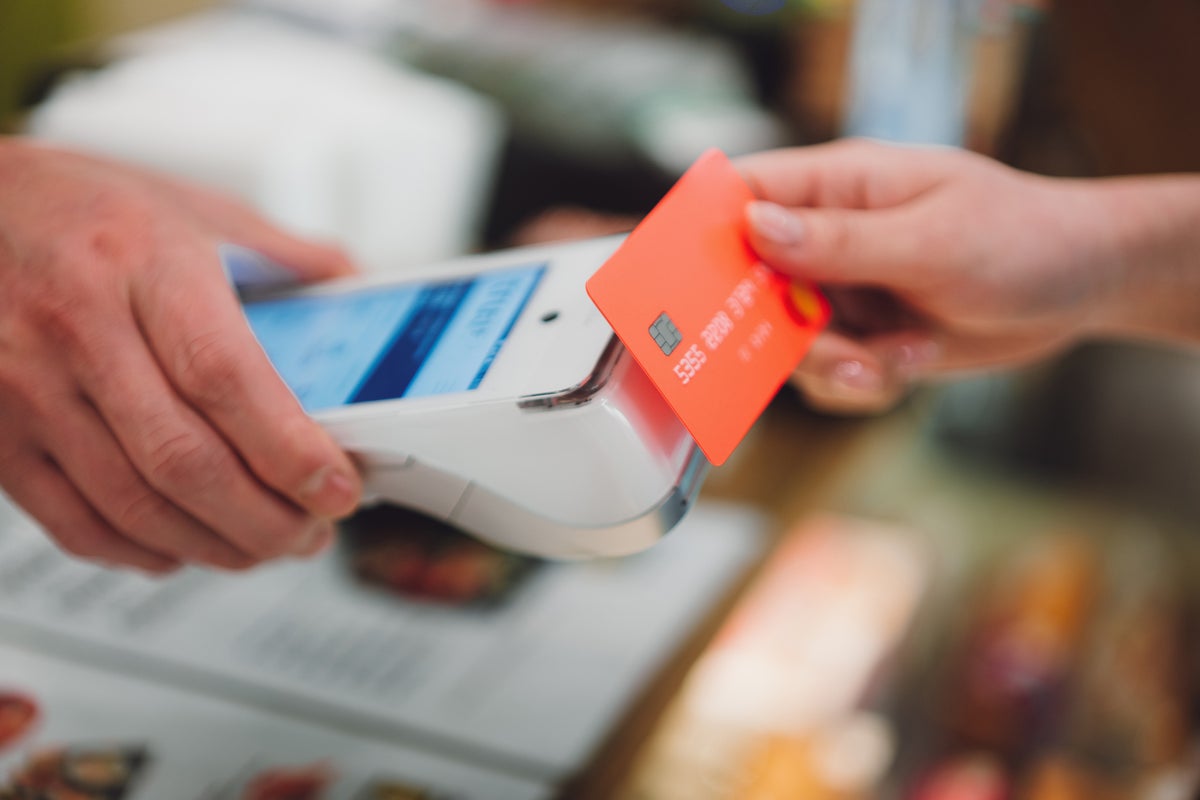Business
Business news live: Contactless payments cap could be scrapped, no interest rates cut

Beware the QR code: How a new scam is costing consumers £10,000 per day
Whether you’re ordering drinks to your table in a pub or want to pay for car parking, QR codes make life simple.
A quick scan of a black-and-white grid on your mobile phone takes you straight to a website to carry out the transaction.
But that harmless-looking square can hide a cunning scam.
Karl Matchett10 September 2025 15:40
Business and Money blog – 10 September
Morning all – we’re back again to bring you all things business and money, the latest economic updates, what our esteemed leaders are up to and how it all affects our pockets and bank accounts.
Stock market updates to come too as usual along the way, with Primark’s owner providing an update this morning.
Karl Matchett10 September 2025 07:54
Primark owner says sales improving despite ‘consumer caution’
The parent firm of Primark has said the retail chain saw trading improve in recent months despite “consumer caution”, as its UK and Ireland stores recovered ground.
Associated British Foods (ABF) said Primark sales are set to have grown by 1% over the half-year to September 13, as womenswear and more favourable weather conditions helped support UK stores.
George Weston, chief executive of ABF, said: “I’m pleased with how the group has performed in the second half of our financial year in what continues to be a challenging environment, characterised by consumer caution, geopolitical uncertainty and inflation.”
Primark opened 15 new stores including two in the UK.
Karl Matchett10 September 2025 08:00
FCA propose for banks to set contactless cap – £100 could become limitless
Right now, you’re doubtless used to paying for things in contactless fashion: hover your card, waft your phone.
Only one of those has a spending limit though: you need a PIN to use your card for payments over £100, the cap which has been in place since 2021.
However, the FCA (who sets the rules) have proposed a change which could come into play in just a few months, whereby your bank will instead set the card contactless limit – which means it could in theory be limitless.
That would match paying by device, even though almost four in five (78%) of consumers said they didn’t want a change in rules.
“People are still protected. Even with contactless, firms will refund your money if your card is used fraudulently,” said the FCA’s David Geale.
Karl Matchett10 September 2025 08:20
Contactless pay cap scrap continues ‘red tape bonfire to speed up growth’
One expert has detailed how binning the contactless pay cap is intended to help us spend more, and more quickly… to help the economy of course.
Whether that’s something consumers actually want – or whether they even think about if they were spending £101 rather than £99 – is up for debate.
But the reminder is there that in fraudulent cases it’s the merchants on the line, not the card owner, so the onus is still on them to check if it’s a big payment or an unusual purchase.
“UK retailers may be hopeful that a further spending boost could come from an expected relaxation of contactless card payment limits,” said Susannah Streeter, head of money at Hargreaves Lansdown.
“The Financial Conduct Authority is proposing to scrap the £100 cap for potentially unlimited transactions, although these would still be set by banks and other providers.
“This is part of a red tape bonfire to try and reduce financial regulation and speed up growth. The idea is that it will be more efficient for retailers and customers alike and will make it easier for consumers to spend more, more quickly.
“This would bring the process more into line with mobile wallets, which can used already for higher-value transactions. There is the potential for increased fraud, but consumers will still have their money protected in the same way, when flagged to a bank.
“It’s the merchants who ultimately pay the price for fraudulent transactions, via the Chargeback process. So, investment in more advanced detection and prevention methods will be even more crucial, including real time monitoring and behavioural analytics to mitigate risks.
“These are investments larger retailers will be better placed to make, but small retailers are likely to be more reluctant to wave through big payments, without extra checks.’”
Karl Matchett10 September 2025 08:40
Vistry profits tumble as home buyers remain wary
Housebuilder Vistry has seen half-year profits more than halve as buyer demand comes under pressure from worries over the wider economy and slower-than-hoped cuts to interest rates.
The group reported pre-tax profits tumbling 55% to £40.9 million in the six months to June 30.
Vistry – formerly Bovis Homes group – said its forward order book was lower than a year ago, standing at £4.3 billion against £5.1 billion this time last year.
It said it was looking to boost flagging demand with “sales and marketing initiatives”.
Karl Matchett10 September 2025 09:23
More Bank of England interest rate cuts no longer likely
Analysts and markets alike are predicting that the Bank of England – or its MPC – may not vote to cut interest rates below 4% for the rest of 2025.
Higher inflation, an uncertain jobs market and the prospect of taxes in the Budget mean many have altered their expectations, with it previously expected the MPC would continue with this year’s pattern of one cut per quarter.
The MPC meets next week, then again in November and December.
HSBC and Pantheon Macroeconomics both now expect no cuts in any of those three meets, with Deutsche Bank switching to only a cut in December rather than the previously anticipated November.
Karl Matchett10 September 2025 09:31
Major analyst still backing one cut – and Budget could impact
Sticking with interest rates, earlier this week, Barclays analysts said in a research note that they are sticking with a November cut as their prediction:
“We see a November cut as finely balanced but, without upside news relative to our forecast in CPI outturns in the coming months, we think that balance continues to tip to a 25bp cut.”
However, they also cite “divergent views [within the MPC voters] and heightened uncertainty” due to the Budget as being big factors at play which could change matters quickly.
The note also points to Rachel Reeves’ big issue:
“We calculate the chancellor will have to find £26.5bn of fiscal consolidation … to meet her fiscal rule.”
Friday’s July GDP release is expected to come out to show no growth month to month, they add.
Karl Matchett10 September 2025 09:45
FTSE 100 rises 0.2 per cent – AI shares on the rise again
Pre-markets show some AI-based US stocks are set to rise later today, while the FTSE 100 on these shores is also up – though at 0.2 per cent, it’s being out-shone so far by France’s CAC 40 at 0.3 per cent in the green.
“European shares pushed ahead on a busy day for corporate news,” said Russ Mould, investment director at AJ Bell.
“A record-breaking day for Wall Street yesterday helped to calm investor nerves over Poland shooting down Russian drones that violated its airspace. Geopolitical concerns have been front and centre for multiple years, and investors had been hoping for tensions to ease.
“Oracle shares soared amid optimism about AI-related revenue, sending a strong message to the broader market that the tech revolution is still red hot. That had a positive read-across to Nvidia which advanced 2% in pre-market trading.
“The FTSE 100 advanced 0.2% to 9,263 as financials and healthcare stocks were in demand.”
Karl Matchett10 September 2025 10:00
Several businesses hope to go public on London Stock Exchange
The London Stock Exchange could get a real boost with 11 new firms looking to list on it.
A report in the FT says several firms are hoping to IPO within the next 12 months, including private equity businesses.
Beauty Tech Group announced their intention to join the LSE this week, with tech firm Visma one of the high-profile names aiming to go public next year.
Only seven companies have done so in London this year so far – the worst in almost three decades, says the FT.
Karl Matchett10 September 2025 10:20
Business
Warner Bros Discovery Inks USD110 Billion Deal with Paramount Skydance

Last Updated:
Warner Bros Discovery signed a SUD 11 billion deal with Paramount Skydance Friday morning, as revealed in a global town hall audio clip.


Warner Bros signs USD 110 billion deal with Paramount (Image for representation)
Warner Bros Discovery (WBD.O) signed a SUD 110 billion deal with Paramount Skydance (PSKY.O) Friday morning, the two companies announced, marking one of the most consequential media mergers in recent history.
“Netflix had the legal right to match the PSKY offer. As you all know, they ultimately decided not to do that. That then resulted in a signed agreement with PSKY as of this morning. So that’s where everything stands,” Bruce Campbell, Warner Bros’ chief revenue and strategy officer, said, as quoted by news agency Reuters.
The companies revealed that the deal is expected to close in the third quarter of 2026.
The deal was inked as Netflix declined to match Paramount’s latest USD 31-per-share offer, pulling out of the bidding war for Warner Bros. Discovery’s studio and streaming assets.
According to the Reuters report, citing sources, Warner Bros received the contracts from Paramount on Saturday and within the following two days, it announced that Paramount’s offer was superior.
The deal was immediately approved by board of directors of both media giants, said the companies in a joint statement.
The deal is “subject to customary closing conditions, including regulatory clearances and approval by WBD shareholders, with a vote expected in the early spring of 2026″, the statement read.
Interestingly, Paramount Skydance is headed by David Ellison, the son of Silicon Valley billionaire Larry Ellison, a close ally of President Donald Trump.
“By bringing together these world-class studios, our complementary streaming platforms, and the extraordinary talent behind them, we will create even greater value for audiences, partners and shareholders — and we couldn’t be more excited for what’s ahead,” David Ellison said in a statement.
NOT A ‘MUST HAVE’
In a stunning move hours later, Netflix announced it would not match Paramount Skydance’s latest offer to acquire Warner Bros Discovery. Netflix co-CEOs Ted Sarandos and Greg Peters asserted that “this transaction was always a nice to have at the right price, not a ‘must have’ at any price.”
TRUMP YET TO COMMENT
At one point, President Donald Trump said he might weigh in on the agreement. However, he told NBC News in early February that he would not be “involved” in the proceedings.
Then, last week, he issued a warning to Netflix, saying it would “pay the consequences” if it did not fire board member Susan Rice, an ex-official of the Biden administration.
During a podcast, Rice had said the entities that “take a knee” to the President would be “held accountable” when Democrats return to the office.
Meanwhile, the President is yet to comment on the deal.
Follow News18 on Google. Join the fun, play games on News18. Stay updated with all the latest business news, including market trends, stock updates, tax, IPO, banking finance, real estate, savings and investments. To Get in-depth analysis, expert opinions, and real-time updates. Also Download the News18 App to stay updated.
Washington D.C., United States of America (USA)
February 28, 2026, 07:48 IST
Read More
Business
UAE makes history: Central Bank launches world’s first sovereign financial cloud with AI for secure digital finance – The Times of India

In a bold leap that could redefine how modern financial systems operate, the Central Bank of the United Arab Emirates (CBUAE) has announced the launch of what it calls the world’s first sovereign financial cloud services infrastructure, a secure and AI-powered digital backbone designed specifically for the nation’s financial sector. This initiative, developed in partnership with Core42 (a subsidiary of AI and technology group G42), aims to position the UAE at the forefront of secure, sovereign digital finance and bolster its reputation as a global hub for innovative financial services.The platform, known as the Sovereign Financial Cloud Services Infrastructure (SFCSI), is set apart from traditional cloud environments by its focus on data sovereignty, integrated cybersecurity and unified multi-cloud management, all underpinned by advanced artificial intelligence and real-time analytics. In practical terms, this means the UAE’s financial sector will be able to process, analyse and automate critical banking functions with unprecedented speed and regulatory control, securely within national borders.
What makes the UAE’s sovereign financial cloud revolutionary
Unlike most cloud services, which are operated by global providers and often host data far from the jurisdictions that regulate them, the SFCSI is built on a fully isolated and centralised infrastructure that ensures critical financial data remains within the UAE’s legal and security perimeter. Governments and regulators see this as key not just for privacy but for economic and strategic sovereignty in a world where data and finance increasingly intersect.This approach mirrors broader global trends toward digital sovereignty, where countries aim to protect sensitive infrastructure from foreign interference, whether from geopolitical tensions or shifting international data laws. By embedding regulatory controls and governance tools directly into the cloud platform itself, the CBUAE is seeking to reduce reliance on foreign systems and strengthen confidence in the nation’s financial resilience.Core42’s involvement is not just as a technical builder; the partnership brings integrated artificial intelligence and advanced analytics directly into the financial backbone. This allows licensed financial institutions and the CBUAE to automate operational processes intelligently, analyse real-time data for risk and performance insights, improve decision-making with predictive models and enhance customer service through automated, data-driven workflows.In a world where financial services are rapidly becoming more complex and interconnected, AI integration at the infrastructure level offers both competitive edge and stronger defences against threats like fraud, system failure or cyber-attacks. The new system also provides a single management framework for multiple cloud services, giving licensed financial institutions the flexibility to administer a range of cloud environments, including private and hybrid setups, seamlessly and securely. This capability is particularly valuable for institutions that need to balance agility and innovation with strict regulatory compliance.
Implications for the UAE and global financial landscape
For the UAE’s banks, insurers and fintech startups, the SFCSI represents a foundational piece of digital transformation. Regulatory oversight will be more immediate and nuanced, while institutions can scale new digital products, from personalised banking apps to smart payment systems, without compromising on security or compliance.Officials from the CBUAE emphasised that the platform will serve the entire licensed financial sector, reinforcing not just operational resilience but also long-term sustainable growth as financial services evolve. The central bank’s leadership views this as a pivotal step in strengthening the nation’s competitiveness on the world stage.The UAE’s move toward a sovereign financial cloud resonates with a broader global push for digital control over critical infrastructure. Various countries are debating how to balance openness to global technology with the need to protect sensitive financial and governmental data, a tension that’s only grown more pronounced as cyber threats increase and geopolitical competition around tech intensifies. By being among the first to embed sovereign control, AI capabilities and cloud innovation at this scale, the UAE is signalling that it intends to lead in secure, regulated digital finance, not just participate in it.While this cloud platform is targeted at the financial sector, its development aligns with the UAE’s wider strategy of integrating AI and digital infrastructure across governance, public services and enterprise systems. The inclusion of AI, real-time analytics and automation at a national infrastructure level could help catalyse further technological development in related fields such as central bank digital currencies (CBDCs), national payments innovation and cross-border financial integration.
What UAE’s sovereign financial cloud platform means for everyday users and institutions
For banks and financial firms, the SFCSI offers a more efficient way to innovate and comply with regulations, potentially making services faster, more secure and easier to tailor to customer needs. For consumers and businesses, the shift could translate into:
- More secure banking services with enhanced protections.
- Better digital experiences built on real-time insights.
- Faster product rollouts as institutions leverage automated, AI-powered infrastructure.
- Greater confidence in data privacy and national sovereignty
The rollout of such an infrastructure may also attract international finance players, tech investors and startups looking to base operations in a secure, innovation-friendly jurisdiction. The Central Bank of the UAE (CBUAE) has unveiled what it calls the world’s first sovereign financial cloud services infrastructure, developed with technology partner Core42.The Sovereign Financial Cloud Services Infrastructure (SFCSI) is designed to ensure data sovereignty, robust cybersecurity, AI integration, and unified multi-cloud management for the UAE’s financial sector. Built with advanced AI and analytics, it will enhance automation, real-time decision-making and innovation within licensed financial institutions. The move reinforces the UAE’s ambitions to be a global leader in secure, digital finance, aligning with broader global trends toward sovereign digital infrastructure.
Business
WBD employees fear coming wave of job losses as Paramount tops Netflix’s bid to acquire company

An American flag flies at Warner Bros. Studio in Burbank, California, on Sept. 12, 2025.
Mario Tama | Getty Images
The Warner Bros. Discovery board may have enriched its shareholders Thursday when it chose Paramount Skydance‘s acquisition offer over Netflix‘s, but it also terrified a lot of its employees.
While some of those people own WBD shares and may prefer the financials of Paramount’s $31-per-share bid to Netflix’s $27.75-per-share offer, CNBC spoke to 10 WBD employees in a variety of different roles at the company. All 10, who asked not to be named for fear of potential backlash, expressed concerns about potential job losses and questions of who would ultimately run their divisions if Paramount and WBD are eventually merged.
“It’s fair to say people are deflated by the news,” said one long-term WBD executive.
Nonetheless, a WBD-Paramount merger “is not a done deal,” as California Attorney General Rob Bonta said yesterday.
The transaction must gain regulatory approval both in the U.S. and in Europe. WBD CEO David Zaslav acknowledged at an all-hands meeting Friday that the deal may still be blocked and expressed sympathy for those experiencing a sense of whiplash going from Netflix to Paramount, according to people familiar with the matter.
“The deal may not close. If it doesn’t close, we get $7 billion, and we get back to work,” Zaslav said, according to leaked audio provided to Business Insider.
Still, several WBD employees told CNBC they wished Netflix had acquired WBD, citing several factors.
While Paramount and WBD both have core competencies in news, sports, theatrical film and streaming TV, Netflix has far less overlap. Netflix co-CEO Ted Sarandos repeatedly said he planned to leave the WBD business alone, keeping its theatrical business separate from Netflix while also keeping HBO Max as a separate, independent streaming service for the foreseeable future.
Netflix also wasn’t acquiring WBD’s linear cable business with its bid. Employees at CNN, TNT Sports and the old Discovery networks would have remained in their jobs to forge a path as a standalone publicly traded company.
Now, WBD employees are staring at potentially massive job cuts. Paramount executives have previously stated they plan to cut $6 billion by eliminating “duplicative operations” on “back office, finance, corporate, legal, technology, infrastructure, et cetera,” according to Chief Strategy Officer Andy Gordon. Both WBD and Paramount have already gone through thousands of job cuts in recent years.
There are also questions about culture and leadership. While Mark Thompson currently runs CNN, Bari Weiss is the editor-in-chief at CBS News and could plausibly have CNN added to her purview.
The Wall Street Journal reported in December that Paramount CEO David Ellison promised President Donald Trump he’d make sweeping changes at CNN if he gained control of the network. Three CNN employees who spoke with CNBC said there’s rampant fear among their colleagues about Weiss making dramatic changes to the cable network’s anchors and tone.
“Despite all the speculation you’ve read during this process, I’d suggest that you don’t jump to conclusions about the future until we know more,” Thompson wrote in a memo to employees Thursday.
CNN media reporter Brian Stelter noted CNN “is a highly profitable business, and it would be foolish for any owner to put that at risk.”
On the entertainment side, WBD employees fear there may be too many proverbial cooks in the kitchen, which could bog down creativity and innovation for both film and TV.
One WBD executive noted that Paramount’s President Jeff Shell, Chair of Direct to Consumer Cindy Holland and Chair of TV George Cheeks are all used to being senior leaders in their organizations. Shell was CEO of NBCUniversal. Cheeks was co-CEO of Paramount before it merged with Skydance. Holland was a top executive at Netflix, where she worked for 18 years.
How that mix meshes with WBD’s entertainment leadership group is an open question and could lead to culture clashes.
TNT Sports is run by Luis Silberwasser and has largely steered WBD toward younger audiences with its programming decisions and investments, including Bleacher Report and House of Highlights. CBS Sports, meanwhile, is driven by the demographics of those who watch CBS and has historically catered to an older audience. This could lead to culture clash, or the divisions could mesh nicely as complementary assets.
While Silberwasser will have to work with CBS Sports President David Berson on employee duplications, like every other department, there’s some reason for optimism in the sports division, because WBD and CBS have worked together for many years producing March Madness, the NCAA men’s basketball tournament. That’s given the units some degree of familiarity with each other.
WBD also lost NBA rights last season. Combining with CBS’ robust portfolio of sports rights, including the NFL and the Masters, makes WBD a major player again in sports, even if it’s as a subsidiary of CBS.
One other repeated concern among employees is the $64 billion in debt coming as part of the $111 billion enterprise value for the deal. Several employees said servicing large debt loads has hindered WBD in recent years, and they feared this could lead to more of the same. Two employees noted there’s comfort being a part of a giant company like Netflix, with a market capitalization of more than $400 billion. Paramount Skydance’s market valuation is just $15 billion.
-

 Tech1 week ago
Tech1 week agoA $10K Bounty Awaits Anyone Who Can Hack Ring Cameras to Stop Sharing Data With Amazon
-

 Business1 week ago
Business1 week agoUS Top Court Blocks Trump’s Tariff Orders: Does It Mean Zero Duties For Indian Goods?
-

 Fashion1 week ago
Fashion1 week agoICE cotton ticks higher on crude oil rally
-

 Politics6 days ago
Politics6 days agoPakistan carries out precision strikes on seven militant hideouts in Afghanistan
-

 Tech1 week ago
Tech1 week agoDonald Trump Jr.’s Private DC Club Has Mysterious Ties to an Ex-Cop With a Controversial Past
-

 Business7 days ago
Business7 days agoEye-popping rise in one year: Betting on just gold and silver for long-term wealth creation? Think again! – The Times of India
-

 Entertainment1 week ago
Entertainment1 week agoThe White Lotus” creator Mike White reflects on his time on “Survivor
-

 Fashion1 week ago
Fashion1 week agoIndia’s $28 bn reset: How 5 trade deals will reprice its T&A exports





